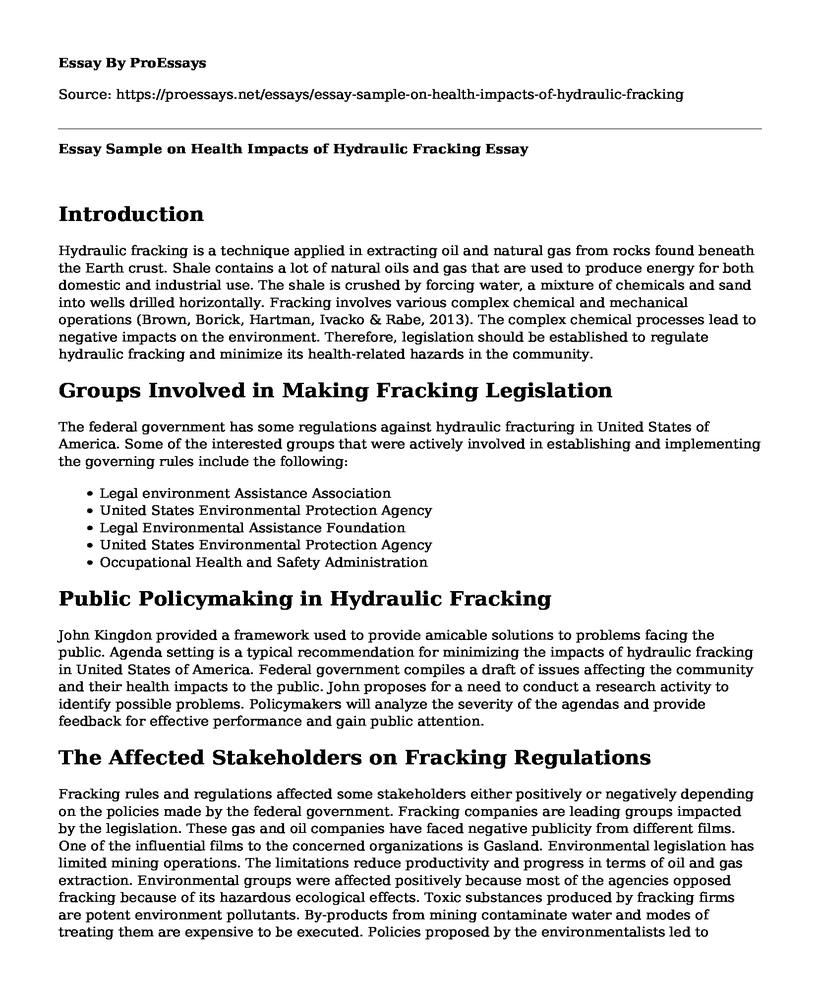Introduction
Hydraulic fracking is a technique applied in extracting oil and natural gas from rocks found beneath the Earth crust. Shale contains a lot of natural oils and gas that are used to produce energy for both domestic and industrial use. The shale is crushed by forcing water, a mixture of chemicals and sand into wells drilled horizontally. Fracking involves various complex chemical and mechanical operations (Brown, Borick, Hartman, Ivacko & Rabe, 2013). The complex chemical processes lead to negative impacts on the environment. Therefore, legislation should be established to regulate hydraulic fracking and minimize its health-related hazards in the community.
Groups Involved in Making Fracking Legislation
The federal government has some regulations against hydraulic fracturing in United States of America. Some of the interested groups that were actively involved in establishing and implementing the governing rules include the following:
- Legal environment Assistance Association
- United States Environmental Protection Agency
- Legal Environmental Assistance Foundation
- United States Environmental Protection Agency
- Occupational Health and Safety Administration
Public Policymaking in Hydraulic Fracking
John Kingdon provided a framework used to provide amicable solutions to problems facing the public. Agenda setting is a typical recommendation for minimizing the impacts of hydraulic fracking in United States of America. Federal government compiles a draft of issues affecting the community and their health impacts to the public. John proposes for a need to conduct a research activity to identify possible problems. Policymakers will analyze the severity of the agendas and provide feedback for effective performance and gain public attention.
The Affected Stakeholders on Fracking Regulations
Fracking rules and regulations affected some stakeholders either positively or negatively depending on the policies made by the federal government. Fracking companies are leading groups impacted by the legislation. These gas and oil companies have faced negative publicity from different films. One of the influential films to the concerned organizations is Gasland. Environmental legislation has limited mining operations. The limitations reduce productivity and progress in terms of oil and gas extraction. Environmental groups were affected positively because most of the agencies opposed fracking because of its hazardous ecological effects. Toxic substances produced by fracking firms are potent environment pollutants. By-products from mining contaminate water and modes of treating them are expensive to be executed. Policies proposed by the environmentalists led to withdrawals of the fracking companies from the operation. Lastly, local residents were also affected, in that, they are immediate subjects of fracking. The public is mostly affected due to environmental pollution (Pless, 2010). Radioactive materials produced fracking sites caused malignancies and other related diseases to residents. The legislation made by the government and the interested groups supported the interests of the local communities.
Common Criticism in Fracking
Fracking is vital in the extraction of naturally occurring minerals. One of the critics against this method is the environmental pollution because that results in acute and serious diseases like asbestosis and melanomas to the public. Water contamination is profound in the process (Castelli, 2015). Therefore leading to interference of natural ecosystem.
Proponent's Opinion on Fracking
The fracking proponents include the company's management. They hold a strong support to fracking because due to a large amount of profits gained from it. Fracking companies oppose the critics because of their belief on the benefits of oils and gases to the American economy and technological advancements.
The Future of Fracking
Public health is key for both social and economic development in the country. Strategies for minimizing health-related risks should be established to improve ecological conditions and safeguard the interests of the people. The release and use of radioactive materials should be avoided to reduce the number of malignancies in the countries.
Additional Legislation
Water regulation should be included in legislation to ensure safety and water disposal. The government should emphasize on the need to implement best production practices. Groundwater protection Council is responsible for the introducing this rule in the country.
References
Brown, E., Borick, C. P., Hartman, K., Ivacko, T. M., & Rabe, B. G. (2013). The National Surveys on Energy and Environment Public Opinion on Fracking: Perspectives from Michigan and Pennsylvania. Center for Local, State, and Urban Policy (CLOSUP),'Survey Report: Climate Policy Options.
Castelli, M. (2015). Fracking and the Rural Poor: Negative Externalities, Failing Remedies, and Federal Legislation. Ind. JL & Soc. Equal., 3, xii.
Pless, J. (2010, December). Regulating Hydraulic Fracturing: States Take Action. Denver (CO): National Conference of State Legislatures.
https://www.youtube.com/watch?v=dZe1AeH0Qz8https://www.youtube.com/watch?v=IYrm4P5hCQE
Cite this page
Essay Sample on Health Impacts of Hydraulic Fracking. (2022, Dec 05). Retrieved from https://proessays.net/essays/essay-sample-on-health-impacts-of-hydraulic-fracking
If you are the original author of this essay and no longer wish to have it published on the ProEssays website, please click below to request its removal:
- The Demand and Supply of Renewable Energy Essay Example
- Building a Robot That Has Conscious Feelings and Thoughts Essay Example
- Essay Example on Computer Science: The Future of Society's Tech Needs
- Essay Sample on Exploring Innovation Approaches to Increase Profits & Productivity
- Essay Sample on Robots Replacing Humans: The Future of Work?
- Paper Sample on UDL-Transform Math Course Syllabus for Student-Centered Learning
- Oculus Virtual Reality and Ethical Issues - Report Sample







